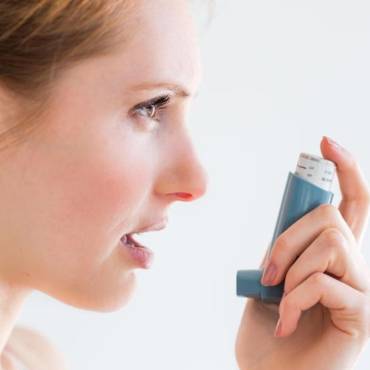Asthma affects your lungs and leads to pulmonary disease and heart failure. The cause of the disease is chronic inflammatory processes in the bronchi or allergic reactions. As a result, there is a narrowing of the lumen of the bronchi; painful cough, shortness of breath, and a feeling of stuffiness in the chest. Allergic reactions such as urticaria, eczema, and psoriasis can be added to the above symptoms. The disease significantly complicates the lives of patients and leads to disability. The main danger of bronchial asthma is edema and spasm of the bronchi, leading to serious respiratory failure, oxygen starvation, and its associated complications. Severe attacks of bronchial asthma in the absence of timely treatment can be fatal.
How to Identify Asthma Symptoms
Despite the advancement in medicine and the pharmacological field, there are still no clear guidelines for the treatment of the disease. Wheezing, coughing (especially at night), tightness in chest or pain in the chest, shortness of breath are some of the common symptoms of asthma. The symptoms of asthma are not the same in every patient as it varies from one attack to the next. I.e. one attack could be a mild one, but next can severe. Some patients experience asthma attacks in extended periods, and some faces every day. Mild attacks are generally common, and patient feel better in few minutes to hours, but the severe attacks stay last longer, and they require immediate medical help
The Main Cause of Asthma
The brain controls all functions in your body. The cells of your brain receive information from all organs and systems, analyse this information, produce the desired reaction, and pass the appropriate orders to the various organs of your body through the nerve cells. You remain healthy as long as your brain clearly and correctly controls these processes.
Bronchial asthma depends upon various factors like any other disease. These factors involved in an improper function of few parts of the brain and a violation of neural connections. In other words, the brain stops giving the required orders for the accurate functioning of your respiratory system, which leads to the development of asthma.
What will happen if Asthma is not treated?
In most cases, bronchial asthma leads to alarming consequences that pose a real threat to your health and life. Among these consequences:
- Swelling and spasm of the bronchi
- Hypoxia (oxygen starvation)
- Allergic reactions
- Tachycardia
- Acute heart failure
According to medical research, the rate of development of these pathologies and complications in recent years is growing rapidly.
If you do not take urgent measures or use ineffective treatment, then powerful pathological processes will inevitably start in your body, which will lead to oxygen starvation of the body and numerous impaired functioning of internal organs. First of all, the brain, heart, and lungs are put under attack. Severe forms of the disease can lead to complications incompatible with life.
Can Asthma be cured completely?
It is impossible to cure asthma completely because it can show up in different ways, and symptoms may be absent throughout life. However, modern medical practice provides for many procedures that relieve the patient’s condition. A pulmonologist can control the required treatment process of asthma. Self-medication is extremely dangerous and can result in health problems. The traditional cycle of preventive procedures includes the use of symptomatic pharmacological preparations, moving towards a healthy lifestyle, and enhancing immunity.
How to defeat asthma as quickly as possible?
It is necessary to restore the clear work of the brain centres responsible for the regulation of the respiratory system. Albuterol containing a Ventolin inhaler available online can help you to cure asthma. The inhaler acts quite quickly; you can buy Ventolin online from reputed online pharmacy.
The drug is used to prevent bronchospasm. This is a bronchodilator, or rather, a selective beta-2-adrenergic agonist. The Inhaler:
- Increases the vital capacity of the lungs and mucociliary clearance
- Activates the ciliated epithelium
- Improves mucus secretion
- Dilates the coronary arteries
- Reduces potassium
- Acts as a hyperglycemic and lipolytic agent
- Affects glycogenolysis and insulin secretion
Consult your physician before using any inhaler to control your asthma.
Also Read: Is Asthma Proven To Be A Chronic Illness?



